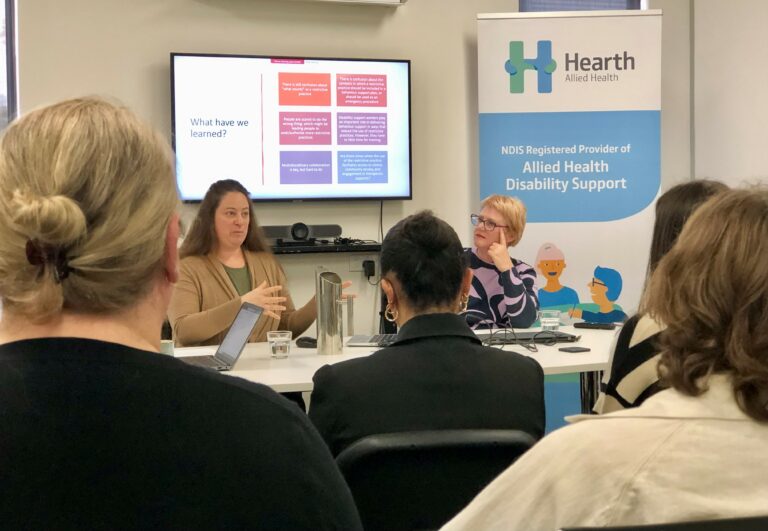The disability sector still has a lot of work to do in training people directly involved in the lives of people living with disability. Moreover, the recommendations of the 2023 NDIA Review and Disability Royal Commission did not adequately address this critical issue because it focussed more on regulation and legislation.
These were among the many insights from our Hearth Advisory experts Dr Erin Lief (Monash University) and Dr Jo Watson (Deakin University) during our recent special Hearth Q&A event.
The event was the second in a series of professional development events for our Hearth Allied Health practitioner team and Disability Support workers. We were also joined online by disability sector professionals and stakeholders.
The session was largely based on questions from attendees tapping into Dr Lief’s expertise on Restrictive Practices and Dr Watson’s expertise on Supported Decision Making.
Changing the systems approach to training
One of Dr Leif’s opening statements emphasised improving systems which focus on training disability support workers in areas such as Restrictive Practices. Subsequently an audience question was put to panel about how ‘systems’’ could identify key areas where training was needed.
In response Dr Watson said dialogue between policy makers and those working on the ground, as well as insights from service providers who are addressing Restrictive Practices and providing training, were critical.
“They [Support Workers and practitioners] are trying to provide support that is person centred and strength based. But there are barriers within the system. So, I think having conversation is really important,” Dr Watson said.
Dr Leif added that this would require combining a bottom up and top-down approach.
“What is really needed is a bottom-up approach where we are training support workers and family members, and we have a top-down approach which involves supportive leadership and strategic initiatives to reduce restrictive practices,” Dr Leif said.
“It is time to bring this all together into a systems blueprint.”
Qualifications for disability sector professionals – a new approach?
The panel was asked about whether was policy consideration of a review of national qualifications.
“My colleagues at the University of Melbourne are currently doing some funded work around micro credentialling qualifications,” Dr Leif revealed.
“So, there are some exciting things happening in that space. We need to show that people are engaging in this professional development. People want career development and recognition for the work they are doing – something like a qualification.
Circle of Support
Our experts also had words of advice for audience members who had questions about a well-functioning “Circle of Support” – especially where there were disagreements.
Dr Watson emphasised the outcome that was key to this – independence.
“What we have seen in my research and others research is that Circles of Support work best when they do so collaboratively,” Dr Watson said.
“So, they work together to analyse expressions of will and preference. This is how autonomy is enhanced.
“We’ve got to do the best we can to come together as a Circle of Support. We have to work together and not argue.”
“This process is easier when there is a dedicated person in place such as a communication coordinator. If there isn’t one person in place to pull it all together … it is not working.” You can watch and listen to the full Hearth Q&A session with Dr Erin Leif and Dr Jo Watson here.


